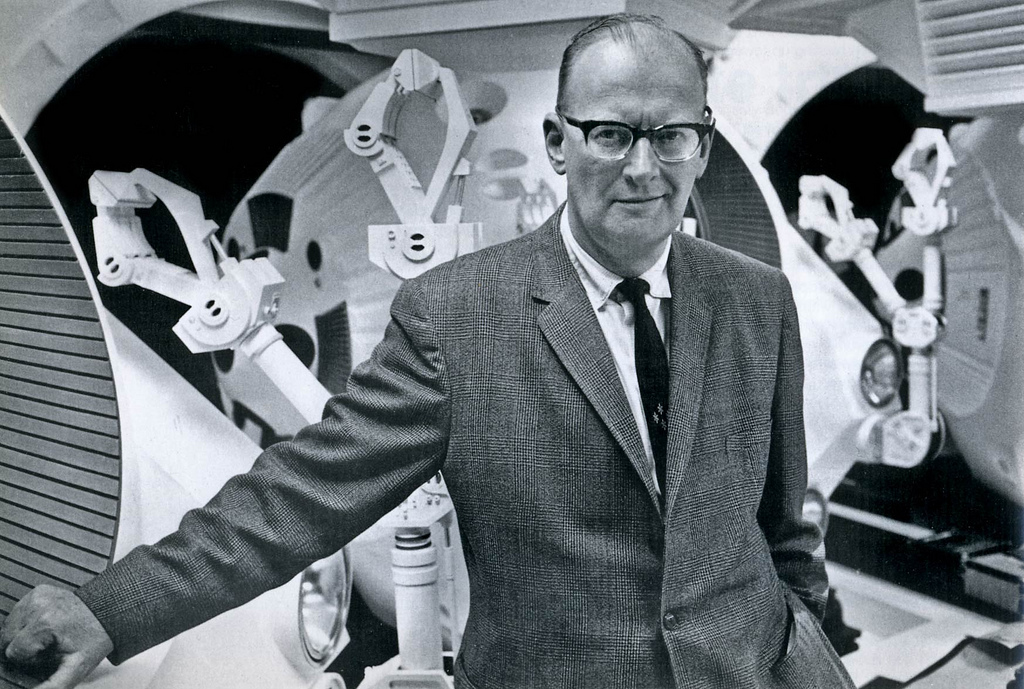Yes, Arthur C. Clarke is worth reading. His short stories and novels are captivating, Clarke has been brave enough to chart paths few other writers have been willing to approach. Stories like The Star and Time’s Arrow are likely to stay with you for the philosophical and moral questions they pose.
Arthur C. Clarke has the mind of an actual mathematician and physicist, who understands the principles of the universe as well as any other expert, making it possible, through fiction, for those of us without this scientific background to appreciate how our relationship to space may evolve.
His most famous two novels, Rendezvous with Rama and 2001: A Space Odyssey, are outstanding, but there are countless other novels and short stories worth reading, each equally profound and perspective-altering.
What’s the Best Arthur C. Clarke Book?

Arguably, the best Arthur C. Clarke book is 2001: A Space Odyssey.
It’s the most well known of his novels, and the one which gave rise to the Stanley Kubrick film after he and Kubrick co-wrote the screenplay together.
You’ll certainly make your own mind up about which Clarke book is the best of the lot, but 2001: A Space Odyssey and the remaining Space Odyssey series (yes, there’s more!) feature many of the characteristics readers enjoy most about Clarke’s writing.
The first novel in the series is unlikely to disappoint!
Where Should I Start with Arthur C. Clarke?
If you’re not sure where to start with Arthur C. Clarke, his short stories offer an excellent point of departure.
‘The Sentinel’ is the short story Clarke based 2001: A Space Odyssey upon, and would make an excellent place to start reading his work.
Clarke often used short stories to trial and develop different ideas before committing the best to longer-form novels.
Clarke’s novel Childhood’s End began life as a short story titled ‘Guardian Angel’, and reading these different short stories may give you the best indication of which Clarke novel you will enjoy starting with the most.
When Was Arthur C. Clarke Writing?
Clarke began writing articles about space travel and short pieces on films and sci-fi as a teenager for Urania, the Junior Astronomical Association’s journal.
Clarke, who left King’s College London with a first-class degree in mathematics and physics, wrote and published a number of non-fiction books about space and space travel as an adult.
Clarke seriously began writing science fiction during the 1970’s, starting with Rendezvous with Rama, which became highly awarded, before moving on to the Space Odyssey series.
A few days before his death, aged 90, in 2008, Clarke reviewed the manuscript of his final novel, titled The Last Theorem.
What are the Best Arthur C. Clarke Short Stories?
Some of the best Arthur C. Clarke short stories are The Star, The Nine Billion Names of God, The Sentinel, Encounter in the Dawn, The Songs of Distant Earth, Time’s Arrow, Before Eden, The Curse and Rescue Party.
Here’s a link to Clarke’s Collected Stories for you to read!
Though there are some similarities between some of these short stories, most of them are quite significantly different.
Clarke’s themes are often the same, but he reaches these through diverse means.
The Curse, for example, is about Shakespeare’s tomb!
Is Arthur C. Clarke Worth Reading?
Yes, it’s definitely worth your while to read Arthur C. Clarke. The short stories and novels Clarke has written develop an outstanding sense of wonder within his reader, and comment effectively upon themes which few other writers are able to broach successfully.
You will find yourself on adventures, the likes of which you never thought possible, once you start reading Clarke.
You will also feel Clarke expanding your horizons as you read more and more about what may, or could be possible for humankind.
As an extremely highly regarded mathematician and physicist, as well as fiction writer, Clarke offers his reader genuine insights into space and hypotheses regarding our future engagement with the universe which we can safely and with certainty regard as possible futures.

